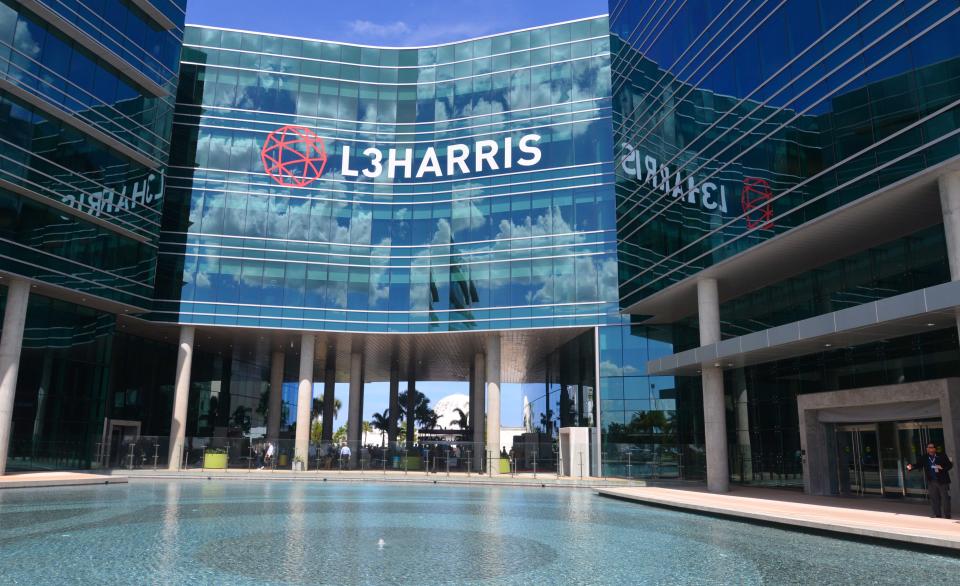Reports say L3Harris sought deal with controversial Israeli spyware company
Melbourne-based aerospace and defense technology company L3Harris Technologies Inc. has been seeking a deal with an Israeli company that developed the controversial Pegasus spyware, according to multiple media reports.
The New York Times and The Washington Post have both reported that those talks with the Israeli spyware company NSO Group appear to have been put on hold after L3Harris received backlash from the U.S. government for pursuing the deal.
It is unclear whether L3Harris was seeking to acquire the entire NSO Group or just the company's powerful Pegasus technology.

L3Harris told FLORIDA TODAY that it would not comment on the issue or on those media reports.
However, this would not be L3Harris' first brush with spyware, as the company has developed its own eavesdropping technology in the past. FLORIDA TODAY reported extensively on the L3Harris proprietary spyware, known as Stingray, which has been used by federal and local law enforcement agencies.
Pegasus, on the other hand, has so far mainly been used by state players. It is an ultra-sophisticated spyware that has been used by governments to gain control of a target's mobile phone, and can remotely access such things as messages, contacts, photos and videos.
The U.S. government in November added the NSO Group and three other foreign companies to the Commerce Department's "Entity List" of companies to which U.S. businesses could not sell technology. It took the action as a way "to stem the proliferation and misuse of tools used for repression," according to a statement issued by The White House.
Dealing with military threats: L3Harris forms group to address military threats and needs in Ukraine and elsewhere
Corporate changes: L3Harris reorganization gives boost to company's Brevard operations
"NSO Group and Candiru of Israel were added to the Entity List, based on evidence that these entities developed and supplied spyware to foreign governments that used these tools to maliciously target government officials, journalists, businesspeople, activists, academics and embassy workers," the Commerce Department’s Bureau of Industry and Security said in a statement issued Nov. 3.
"These tools have also enabled foreign governments to conduct transnational repression, which is the practice of authoritarian governments targeting dissidents, journalists and activists outside of their sovereign borders to silence dissent. Such practices threaten the rules-based international order," stated the Commerce Department.
During a Nov. 9 media briefing, Commerce Secretory Gina Raimondo said: "We came to a determination that it was necessary for national security in order to impose that" Entity List sanction.

'Very powerful tool'
Jennifer Stisa Granick, surveillance and cybersecurity counsel for the American Civil Liberties Union's Speech, Privacy and Technology Project, said Pegasus is among the most sophisticated technologies of its kind, partly because of its "zero-click" technology. That means the spyware is activated without the need for the target to click on a malicious link.
And, Granick said, not only is Pegasus able to access the data on a cell phone — including from the supposedly more secure iPhones — but it also can remotely activate a phone's microphone and video camera, thereby enabling the entity doing the spying to know what the target is saying and doing.
"They can listen to you and watch you," Granick said. "Pegasus is a very powerful tool. This is a secretive piece of technology licensed to governments around the world."
During a Dec. 3 media briefing, then-White House press secretary Jen Psaki was asked by a reporter about U.S. diplomats having their iPhones hacked in recent months by spyware from the NSO Group.
"I have seen this particular report," Psaki replied. "We have been acutely concerned that commercial spyware, like NSO Group’s software, poses a serious counterintelligence and security risk to U.S. personnel, which is one of the reasons why this administration has placed several companies involved in the development and proliferation of these tools on the Department of Commerce’s Entity List. We have also mobilized a governmentwide effort to counter and curb proliferation of these commercial hacking tools."
Efforts may continue
Despite the latest published reports indicating that the deal between L3Harris and the NSO Group may be on hold, Granick doesn't believe efforts won't continue to acquire the Pegasus technology.
She said that could emanate from L3Harris, another U.S. tech company or another company based in the so-called "Five Eyes" group of intelligence countries that work together and share information. The counties other than the United States in that alliance are Australia, Canada, New Zealand and the United Kingdom.
"This is not the last effort by a U.S. company to buy this technology," Granick said.
Granick said, although the Biden administration apparently has been opposed to the NSO Group's use of the Pegasus technology, she believes there are elements of the U.S. intelligence community that would like access to the technology — potentially through a deal with a U.S. company like L3Harris.
The talks between L3Harris and NSO were first reported by Intelligence Online.
Stingray controversy
Granick noted that L3Harris has been involved in controversial spying software before, when the company developed the Stingray technology that has been used by a wide range of law enforcement agencies.
On its website, the ACLU noted that "Stingrays, also known as 'cell site simulators,' are invasive cell phone surveillance devices that mimic cell phone towers and send out signals to trick cell phones in the area into transmitting their locations and identifying information. When used to track a suspect’s cell phone, they also gather information about the phones of countless bystanders who happen to be nearby."
"Law enforcement agencies all over the country possess Stingrays, though their use is often shrouded in secrecy," the ACLU reported. "The ACLU has uncovered evidence that federal and local law enforcement agencies are actively trying to conceal their use from public scrutiny, and we are continuing to push for transparency and reform."
L3Harris sales top $17.8 billion
L3Harris provides advanced defense and commercial technologies across space, air, land, sea and cyber domains. It has customers in more than 100 countries.
L3Harris has about 47,000 employees worldwide, including 7,750 in Brevard County, making it Brevard's third-largest employer, behind Brevard Public Schools and Health First. The company had $17.81 billion in revenue in 2021.
Two of the company's three segments are based at the L3Harris Technology Center in Palm Bay. One is integrated mission systems; the other is space and airborne systems. The third segment — communication systems — is based in Rochester, New York.
Dave Berman is business editor at FLORIDA TODAY. Contact Berman at dberman@floridatoday.com. Twitter: @bydaveberman.
Support local journalism and journalists like me. Subscribe today.
This article originally appeared on Florida Today: L3Harris won't comment on reports of efforts to seek spyware deal

